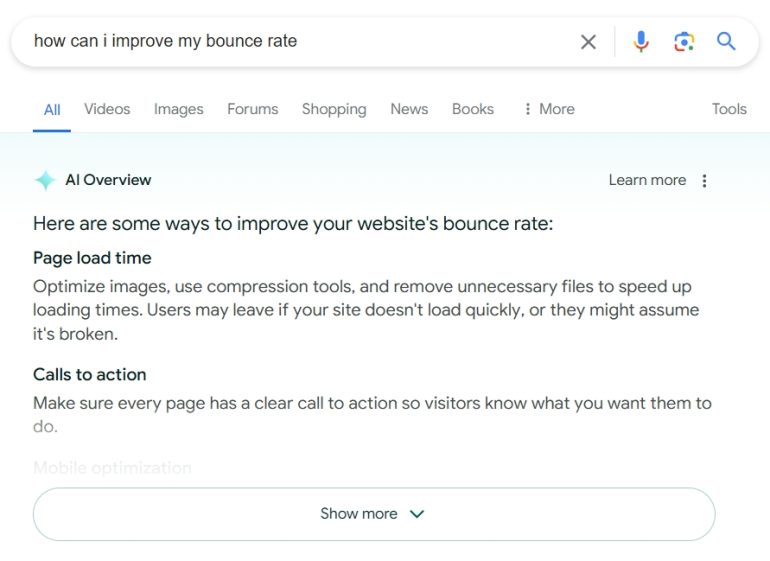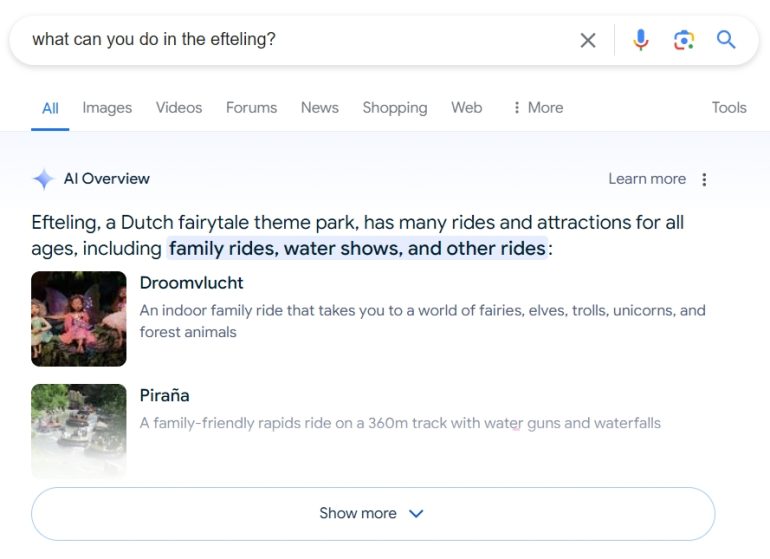Google has been experimenting with the Search Generative Experience (SGE) for over a year now, using generative AI in search results. This feature has been rolled out live in the United States from May 14, 2024 (date of the Google I/O conference) under the name ‘AI overview’ and is expected to come to the Netherlands at the end of this year.
Although this will take some time, it is useful to get an idea of the possible impact on SEO so that you as a website/webshop owner or advisor can anticipate this. I often get the question: “Are we going to lose even more organic traffic now?”
What is AI overview?
In short: Google AI overview is a new feature in Google Search. It is a Gemini-generated summary of search results that appears at the top of the SERP (search results page). These overviews combine information from different sources and are designed to give users a quick and clear picture of their search query.
With this new feature, Google wants to prevent Google users from switching to open AI tools like ChatGPT. And they hope to keep visitors on their platform longer. They want to keep the continuous flow of Google users and preferably grow it further.
First experiences in the USA
This feature has been online in America for 6 weeks now. Time to take stock. I connected a VPN and tested this feature extensively. In total, I submitted approximately 200 searches/questions to Google USA, with the following questions in mind:
- What do AI overviews look like?
- When do they appear and when not?
- Does it have added value for me as a user?
- Am I getting wildly excited?
- Can I as a user really do anything with this?
- What is the impact after AI overview on SEO?
When will you see AI overview?
Google does not show an AI overview for every search query. This feature appeared for less than 25% of my searches (over 200). It was not really easy to get the AI overview to appear. The system itself determines when generative answers are useful for the user.
AI overview appeared for these search queries:
- what to do with a headache?
- is McDonald’s healthy?
- what is an average income per year?
- how old is the oldest person in the world?
- does seo cost money?
- which superfoods boost metabolism?
- how can I improve my bounce rate?
- what can I do in the Efteling?
I noticed that the AI overview appears mostly for informational search intents. For questions that start with these words:
I was especially curious whether AI overviews appear for more commercial search queries, such as the questions below:
- where can i buy nike jordans?
- how much do nike jordans cost?
- where in nyc do i find the best pizza?
- give me websites for best price nike shoes
- electric forklift?
- where to buy cheap supplements
But for these types of questions, AI overview hardly appeared.
Are Google’s AI overviews helpful?
Apart from the AI overview blunders about putting glue on your pizza and eating stones being healthy, I was curious how useful these AI overviews actually are.
I deliberately use the Google term ‘helpful‘. As the founder of helpful content, these AI overviews from Google must of course also meet this criterion. If I EEAT and the helpful content guidelines want to read through, I’ll definitely spend hours struggling through it. Then they’ve probably done their homework thoroughly when it comes to this AI overview feature. Time to check the usefulness of Google’s AI overview, here are 2 examples.
Example 1: Increase bounce rate
One of my searches in Google USA was: “how can I improve my bounce rate”. A number of things stood out.

AI overview in Google USA / 06-07-2024
1. You don’t get a ready-made answer
When I ask how I can improve my bounce rate (in English in Google USA), an AI overview appears. What immediately strikes me is that I don’t really get a bite-sized answer. A kind of article is displayed of which only the headline and 2 paragraphs are visible. I don’t know much more at this point. A qualitative meta tag would be more helpful.
2. The result is purely factual
The tips that are there, consist only of facts. No conclusion, opinion or advice, they immediately come to the house with:
Optimize images, use compression tools, and remove unnecessary files to speed up loading times. Users may leave your site if it doesn’t load quickly, or they may assume it’s broken.
3. The result is difficult to read
Google has chosen to give each overview a tint of color, in this example the color light green. That fades downwards. This ensures that the AI overview is not really easy to read. And apart from the color, the whole thing comes across as a bit woolly.
4. You don’t get a human experience
Google has indicated in its helpful content update that content from human experience is important. People first in creating content and putting your content at the center. A bit lame, but it should be clear that the content in this AI overview was composed by AI and not by a person. No trace of experience, examples or humanity to be recognized…
5. There is no source reference
Also one of the guidelines of Google’s own helpful content guidelines is the use of source references. I don’t see them. When I click open the ‘read more’ I do see 3 poorly readable blocks, but these are not sources, zero.
What I do see (under: ‘more options’), is this (translated):
This overview was created using AI. It is powered by information from the web and Google’s Knowledge Graph, a collection of information about people, places, and things. Generative AI is experimental and information quality may vary. For help evaluating the content, visit the links provided. Read more about Generative AI to learn more about data, privacy, and more.
6. Authorship is missing
This is also such a nice EEAT point, who created this content? Was it SEO guru Neil Patel about the bounce rate or a fanatic intern? And indeed, I usually find it quite nice to know who is an author of an article on a website. Well, content that is mixed together from various sources… does not have a complete author.
Example 2: What can I do at the Efteling?
Another example then: “What can you do in the Efteling?”

AI overview in Google USA / 06-07-2024
In this example I get the same feeling. A large area with few concrete answers, the blurring of the image does not benefit the readability… And after reading the content of this AI overview I don’t know much anymore.
AI’s answer in loose text below:
“Efteling, a Dutch fairytale theme park, has many rides and attractions for all ages, including family attractions, water shows and other attractions:
Dream flight
An indoor family ride that takes you to a world of fairies, elves, trolls, unicorns and forest animals
Piranha
A family-friendly rapids course of 360 meters with water pistols and waterfalls”
What does ChatGPT bake?
I decide to ask the same question to ChatGPT and I only add the restriction ‘in 50 words’ (to compare it well in this example). ChatGPT answers the following:
“At Efteling you can enjoy attractions such as the Python and Baron 1898, explore the Fairytale Forest, watch exciting shows, and eat delicious food. Efteling offers adventures for all ages with roller coasters, water attractions, and enchanting stories that come to life in a magical park.”
Wow… that’s already 100% more helpful! If someone in America wants to know what to do in Efteling, the answer from ChatGPT is much more helpful!
But hey, it’s still Google and whether you like it or not, you will probably see these AI overviews appear in Google Netherlands before the end of the year.
So what is the impact of AI overview on SEO?
From my tone, you can understand that I am not really enthusiastic about this new Google feature. Initially, Google announced that it would appear in more than 50% of all search results… based on my testing, this seems unlikely. Perhaps they have already reduced this number?
In my research I tested about 200 search queries and really looked for questions where the AI overview would appear with a high probability. I came up with a percentage of over 20%.
If the content and quality of these AI overviews don’t improve, then I think the impact of this new feature not significantly large will be. But hey, Google has just 6 weeks of experience with this in America and there is a good chance that the content of this feature will be improved.
Impact on informational search intent
If Google manages to improve the quality of these AI overviews, it could have an impact on your SEO.
It is mainly about informational search intents. It is then good to know that these are the types of websites where there is a good chance that AI overviews will appear regularly.
- Encyclopedic sites
- Q&A platforms
- Educational and informative sites
- Health and medical information sites
- Online dictionaries and lexicons
- Financial and investment sites
- Lifestyle and DIY websites
- List and ranking sites
How can you optimize your content for AI overviews?
If you have an online store or a commercial website, I suspect you will lose little organic traffic.
However, there are quite a few voices from specialists who advise you to optimize your content for AI use, by:
- mainly to create content questions that start with the words: how, what and why
- expand your content with high-quality long-tail keywords with low search volumes
- Conduct targeted keyword research on words where AI listings appear most often
- etc.
But: I wouldn’t do this. Because then you’re back to old-fashioned SEO (optimizing for search engines). Perhaps it’s useful to renew this term to, for example, PEO (People Experience Optimization), so that you don’t forget what it’s all about in the end.
There is still plenty of SEO space
I also hear regularly: “Is it still wise to do SEO? Does it actually still work?”
And it is true that the percentage of organic traffic that Google still sends to websites has decreased (from around 45% to around 35% in the last 5 years). But it is often forgotten that in that same period the number of absolute searches within Google has grown even faster. So there is plenty of room for SEO!
If you have a consumer web shop or website, there is still enough SEO potential left to continue to get organic traffic to your website. And as it looks now, AI overview will not have much impact on this more commercial organic search traffic.
For example, I don’t see Bol.com getting nervous that a significant portion of their 15 million monthly organic searches could disappear due to the arrival of AI overview in the Netherlands.
Plenty of SEO opportunities with helpful content
It is important to know that you will not achieve much with the ‘old’ way of SEO (lots of content, lots of keywords, long texts, meager links). It is now really about unique helpful content from a people first approach. How to approach that you can read in my previous article, in which I describe how I achieved 125% organic growth in 4 months purely with helpful content.
I hope this post was helpful to you
Header image source: DIA TV / Shutterstock.com
Source: www.frankwatching.com


